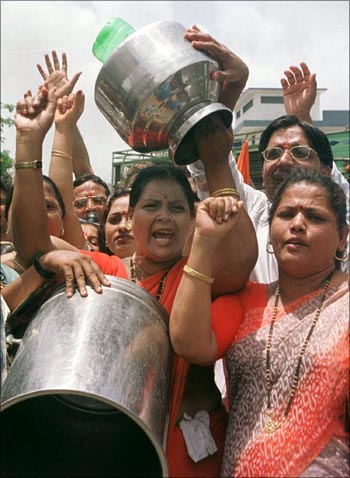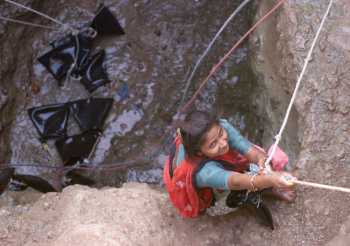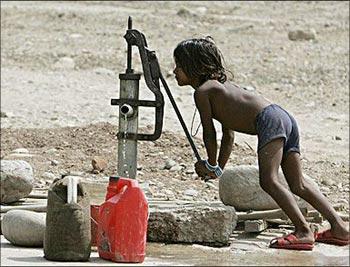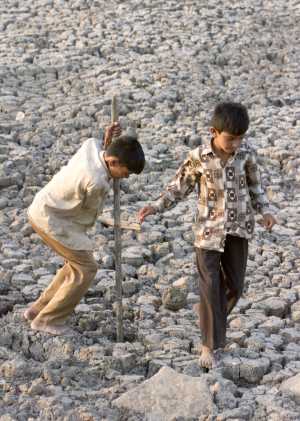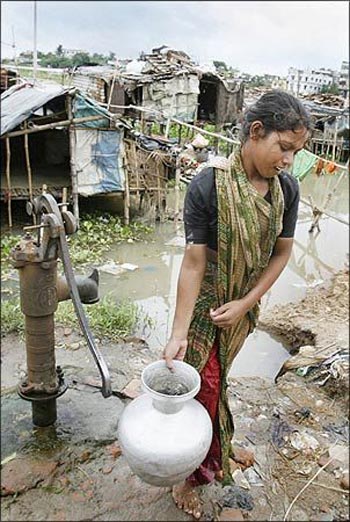 | « Back to article | Print this article |
Water scare! Mumbai reservoirs to go dry soon
In the aftermath of scanty rainfall, Mumbai's citizens have been warned that only 200 days of water supply is there at present in the major reservoirs, which means grim days ahead.
The Brihanmumbai Municipal Corporation has introduced a 15 per cent cut in supply, which is expected to be increased to 30 per cent.
There is also talk of no supply once a week, but a decision on that will be after consultation with political parties.
Click NEXT to read further. . .
Water scare! Mumbai reservoirs to go dry soon
The metropolis is presently getting a daily supply of 2,320 million litres, against the 3,450 million litres supplied by BMC during normal times. The demand for water from the 12.5 million population is actually estimated at 4,550 million litres a day.
As on December 15, the reservoirs had only 71 billion litres, against 1000 billion litres available during the same date last year. Ironically, as much as 560 million litres is estimated to be lost daily due to leakage and stealing.
The state government has already announced that no water connection would be provided to highrise buildings in Greater Mumbai till 2012, when three new water reservoirs would be completed.
Water scare! Mumbai reservoirs to go dry soon
This has evoked angry reactions from the realty sector, as nearly 1,400 projects cleared by BMC, with total investment of over Rs 25,000 crore (Rs 250 billion), would be in jeopardy. The construction of three water projects, Madhya Vaitarana (455 million litres), Gargai (455 million) and Pinjal (865 million) is underway.
The Congress-NCP government has taken a decision to regularise slums which had come up by the year 2000 in Greater Mumbai, but the BMC is in no hurry to plan for water supply to these shanties.
It says it has also stepped up action on water theft; insiders say a fifth of supply is lost due to leakage and pilferage. It also plans to gear up on metering of supply.
Water scare! Mumbai reservoirs to go dry soon
The state government is contemplating a separate legislation to allow punitive action against misuse of water and causing pollution, by making it a cognisable offence.
A fine of Rs 25,000 and six months in jail is being envisaged.
The government admits the water shortage is not restricted to Mumbai and other big cities, but is also being faced by smaller towns and villages.
It plans to set up state and district-level authorities for underground water. And, says it plans to emphasise conservation of water sources and use of water through participative management.
Water scare! Mumbai reservoirs to go dry soon
Prior permission of a civic or local body would be necessary in future to dig a well, especially in a water-deficit situation. Besides, drinking water would get priority over industrial use in such circumstances.
So far, the government has got 18 proposals on supply through desalination of water.
However, the costs are high. According to the government calculations, BMC needs to pay Rs 35-40 for every 1,000 kl of saline water conversion into potable water.
Water scare! Mumbai reservoirs to go dry soon
The government and BMC agree that such a project is a necessity to reduce pressure on existing water supply sources, but are still unclear on how to meet such costs.
BMC currently does have one desalination project plan, a pilot one, for residents of Navy Nagar, which houses personnel and kin from the navy in South Mumbai. The cost projected for supplying a million litres is Rs 125 crore (Rs 1.25 billion).
As for rainwater harvesting, it has yet to gather momentum anywhere. Says a government official: "It is yet to take off in the true sense, as there is no mindset. The public has a tendency to rely on the government or on BMC. They are not inclined to take the initiative for such projects.
Water scare! Mumbai reservoirs to go dry soon
"People, at large, are apprehensive about the expenditure, which is around Rs 100,000-500,000 for a well-planned water harvesting project.
On top of it, the administration lacks the necessary drive to promote it. Though it has been made mandatory for new buildings in Mumbai, there is no monitoring agency to track its implementation."

